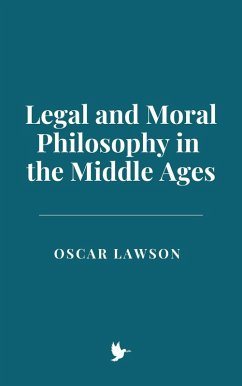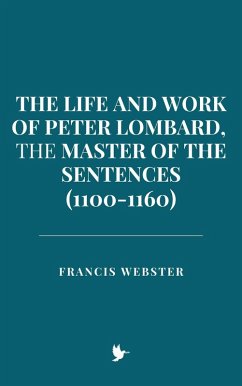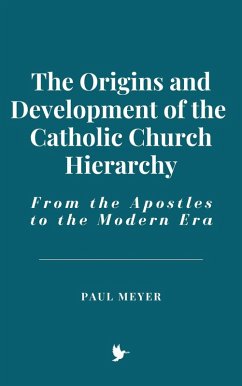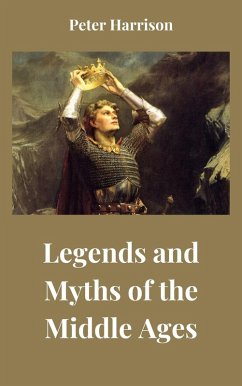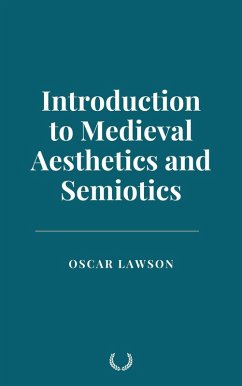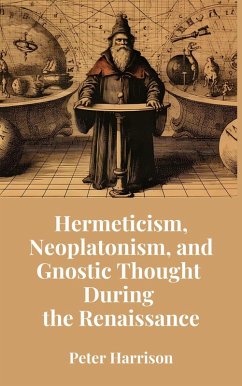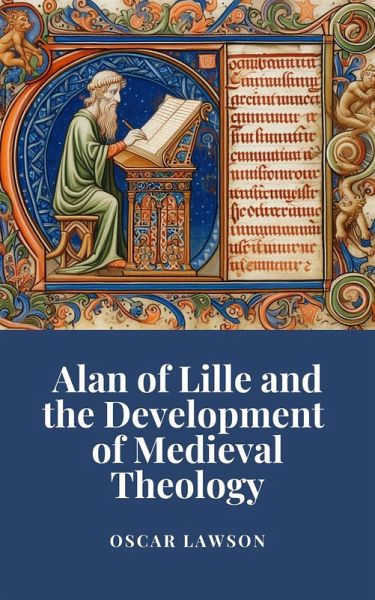
Alan of Lille and the Development of Medieval Theology (eBook, ePUB)

PAYBACK Punkte
0 °P sammeln!
"Alan of Lille and the Development of Medieval Theology" is a comprehensive exploration of the life, works, and enduring influence of Alan of Lille, a pivotal figure in the intellectual and theological landscape of the twelfth century. Spanning fifteen chapters, the book delves into Alan's origins in Lille, his extensive education, and his emergence as a leading theologian, poet, and philosopher during a period often referred to as the Twelfth-Century Renaissance.The book begins by situating Alan within the vibrant intellectual climate of his time, marked by the resurgence of classical knowled...
"Alan of Lille and the Development of Medieval Theology" is a comprehensive exploration of the life, works, and enduring influence of Alan of Lille, a pivotal figure in the intellectual and theological landscape of the twelfth century. Spanning fifteen chapters, the book delves into Alan's origins in Lille, his extensive education, and his emergence as a leading theologian, poet, and philosopher during a period often referred to as the Twelfth-Century Renaissance.
The book begins by situating Alan within the vibrant intellectual climate of his time, marked by the resurgence of classical knowledge, the rise of Scholasticism, and significant theological debates. It examines his early life and education, highlighting how his formative experiences and studies at renowned institutions like the Cathedral School of Chartres and the University of Paris shaped his intellectual pursuits.
Central to the narrative is an in-depth analysis of Alan's theological works, including his treatises against heresy and his systematic defenses of orthodox Christian doctrine. The book explores his unique ability to harmonize reason and faith, showcasing how he employed logical reasoning and classical philosophy to articulate and defend theological concepts. His contributions to moral theology, particularly his discussions on virtue, natural law, and the ethical responsibilities of individuals, are thoroughly examined.
The work also delves into Alan's poetic masterpieces, notably the Anticlaudianus and De Planctu Naturae. These allegorical poems are analyzed for their rich symbolism and innovative use of literary devices to convey complex theological and philosophical ideas. The book highlights how Alan's integration of poetry and theology bridged the gap between scholarly discourse and artistic expression, influencing subsequent medieval literature.
A significant portion of the book addresses Alan's strategies in confronting heresy, emphasizing his commitment to education, pastoral care, and rational discourse as means of defending orthodox Christianity. It discusses the critiques and controversies surrounding his work, providing a balanced view of the challenges he faced and the debates he engendered.
The influence of Alan on Scholasticism and medieval thought is a focal point, demonstrating how his methodologies and ideas shaped the intellectual traditions of his time and influenced prominent figures like Thomas Aquinas. The book traces the reception of his works during the Renaissance and beyond, illustrating the enduring relevance of his contributions to theology, philosophy, and literature.
Through this comprehensive study, readers gain valuable insights into the complexities of medieval thought, the interplay of reason and faith, and the timeless quest to understand the divine and the human condition.
The book begins by situating Alan within the vibrant intellectual climate of his time, marked by the resurgence of classical knowledge, the rise of Scholasticism, and significant theological debates. It examines his early life and education, highlighting how his formative experiences and studies at renowned institutions like the Cathedral School of Chartres and the University of Paris shaped his intellectual pursuits.
Central to the narrative is an in-depth analysis of Alan's theological works, including his treatises against heresy and his systematic defenses of orthodox Christian doctrine. The book explores his unique ability to harmonize reason and faith, showcasing how he employed logical reasoning and classical philosophy to articulate and defend theological concepts. His contributions to moral theology, particularly his discussions on virtue, natural law, and the ethical responsibilities of individuals, are thoroughly examined.
The work also delves into Alan's poetic masterpieces, notably the Anticlaudianus and De Planctu Naturae. These allegorical poems are analyzed for their rich symbolism and innovative use of literary devices to convey complex theological and philosophical ideas. The book highlights how Alan's integration of poetry and theology bridged the gap between scholarly discourse and artistic expression, influencing subsequent medieval literature.
A significant portion of the book addresses Alan's strategies in confronting heresy, emphasizing his commitment to education, pastoral care, and rational discourse as means of defending orthodox Christianity. It discusses the critiques and controversies surrounding his work, providing a balanced view of the challenges he faced and the debates he engendered.
The influence of Alan on Scholasticism and medieval thought is a focal point, demonstrating how his methodologies and ideas shaped the intellectual traditions of his time and influenced prominent figures like Thomas Aquinas. The book traces the reception of his works during the Renaissance and beyond, illustrating the enduring relevance of his contributions to theology, philosophy, and literature.
Through this comprehensive study, readers gain valuable insights into the complexities of medieval thought, the interplay of reason and faith, and the timeless quest to understand the divine and the human condition.
Dieser Download kann aus rechtlichen Gründen nur mit Rechnungsadresse in A, B, CY, CZ, D, DK, EW, E, FIN, F, GR, H, IRL, I, LT, L, LR, M, NL, PL, P, R, S, SLO, SK ausgeliefert werden.






